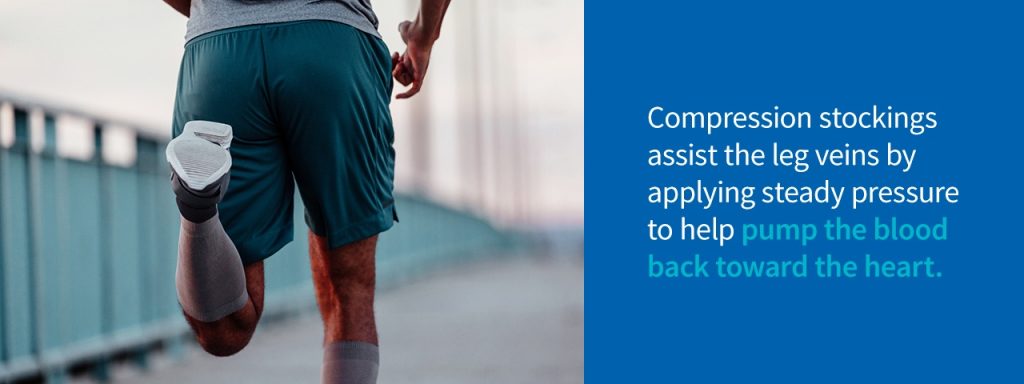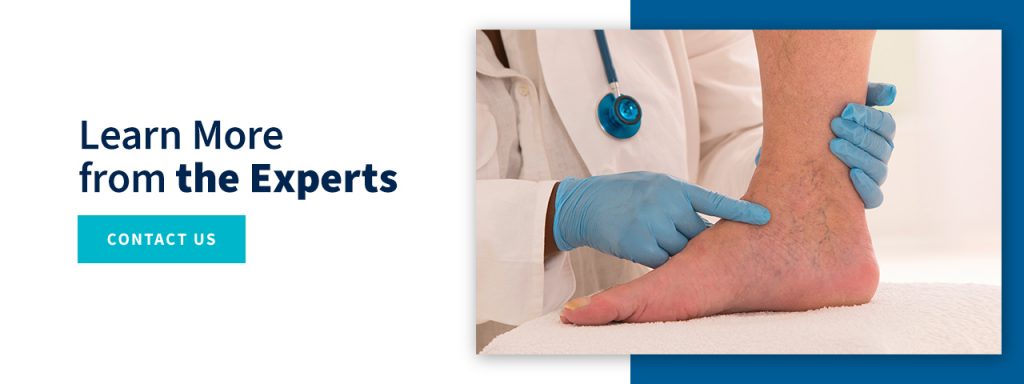
For the last few weeks or so, you’ve been experiencing leg pain. Your legs have been aching, and they’ve felt heavy, restless, and itchy. Then one day, you noticed the dark, bulging, rope-like cords twisting underneath the surface of your skin. You decided it was time to call a vein care specialist to learn more about vein health, ask questions about your discomfort, and understand your treatment options! We can make sure you feel comfortable and prepared for your appointment.
The symptoms you’ve been experiencing, as well as the veins you saw in your legs, are called varicose veins. These occur when the vein valves in your legs become weak or damaged, and as a result, blood flows backward and pools in the vein. Veins become swollen and twisted, causing varicose veins to form.
As you start to experience unusual discomfort in your legs, begin to make notes. Write down all the symptoms you’re experiencing, even if you don’t believe that they’re connected to your vein health! By writing them down, you ensure that you’ll be able to describe them in detail, and you’ll remember things that you would not have remembered otherwise. Sharing precise descriptions of your symptoms helps your physician accurately evaluate your vein health and determine the best course of action. Consider assessing your symptoms with the following questions:
If you have a family history of varicose veins, you are more genetically inclined to develop them yourself. Research and interview your family members. Have any of them had varicose veins or spider veins? Write down any relevant family history. Since women are at a greater risk of developing varicose veins, make sure to ask your female relatives about their history of venous insufficiency.
Do you have a job that requires frequent sitting or standing for long periods of time? Do you have to travel a lot, or does your job require that you wear heels to work every day? Do you take walks, exercise throughout the week, or bend or flex your legs throughout the day? Your doctor will want to hear about your job, your daily activity, and your lifestyle. Let your doctor know anything that will make his evaluation more thorough.
Are you taking any prescriptions? Write down any medications, supplements, or vitamins that you currently take, or any allergies that you have. These are important to make your doctor aware of! They may affect what treatments you are eligible for.

If you have purchased compression stockings in the past, particularly if you wear them, don’t forget to bring them to your appointment. Many mistakenly believe that compression stockings are created to be “one size fits all,” and they buy a pair without being seen by a professional. It’s important that you are wearing stockings that are the perfect size and compression for you! At your consultation, the specialist can determine if compression stockings are the best choice, and then they can help you find the best ones.
Do you have any medical history that your doctor should know about? Even if you’re unsure if your history is related to venous insufficiency, come prepared to discuss any details or information about previous tests, lab work, or surgeries you’ve had. Make sure that you bring your photo ID and insurance card as well.
Are you pregnant, or do you believe you might be pregnant? If you have been pregnant before, come prepared to discuss your vein history while you were pregnant. This is important to know before coming in for a consultation; it could affect which procedures you are a candidate for, and it can ensure your physician properly assesses your symptoms.
In addition to observing and recording your symptoms, start thinking of any questions that you would like to ask our expert physicians. We are happy to answer any and all questions you have! Our top priority is providing the best possible patient care, and we want to ensure all your concerns are addressed. Some questions you may want to ask include:
Our blog offers in-depth information on a variety of vein-related topics. Before you come in for your consultation, peruse our posts to build your education, and write down any additional questions you may have.

No matter what procedure you choose, we offer minimally invasive or noninvasive procedures with little downtime. Patients can get back on their feet and back to their regular lifestyle as soon as possible.
Although it’s natural to feel nervous before a consultation, we want to make sure you feel as comfortable as possible! The vein specialists in Orlando at Central Florida Vein & Vascular treat our patients as individuals, and we understand the importance of fully assessing their vein health before proceeding with treatment. You can find us in one of four convenient locations in Ocoee, Kissimmee, the Villages, and Oviedo. Schedule a consultation with one of our specialists today by calling 407-545-3385 or 352-658-5547.